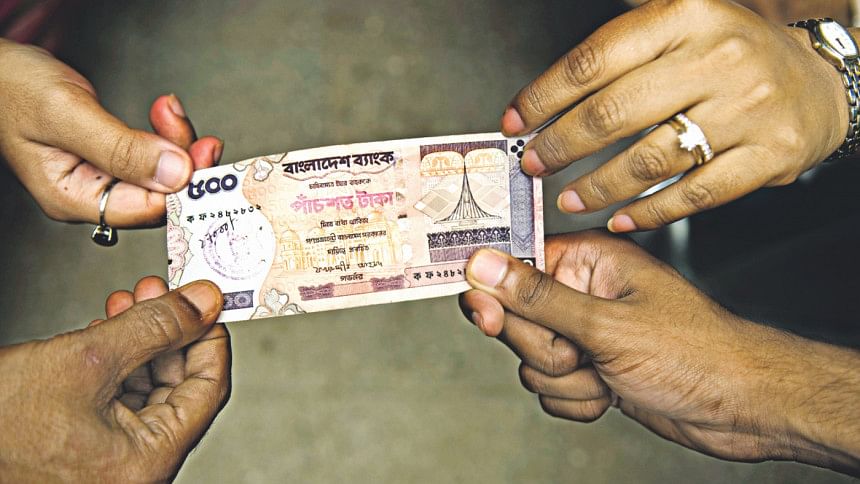Money, mind and behavioural addictions

Invention of 'money' is hard to trace back, but historians believe metal objects were first used as money before the time of written history. Transition from barter system to monetary system took place over time for the sake of fairness and convenience in trade. As human needs got more refined, exchanges became more complex, communication became more technology dependent, newer methods and skill sets had to come into play.
Eventually, division of labour got more acute, distance between supplier and consumer grew further. Consequently, money started to gain more power and influence over human life.
Attachment to money (relationship with object, consumerism, living in pleasure principle) became a new norm. Overt or covert meanings and values given to money at personal, cultural, social and political level could make money a source of self-destruction for a nation, if not the whole mankind.
There is 'money of account' (debits and credits on ledgers), which give people a sense of who owes whom and there is 'money of exchange' (e.g. coins, bills etc.). Another kind of exchange in the form of gifts are considered as reciprocal altruism that serves the basic human yearning to love, connect, and belong. Respectful give and take relationship can maintain social harmony by allowing people to live interdependently in a neatly woven social fabric of support and collaboration.
Ironically, sometimes gifts become implicit 'I owe you' debt or social status symbol when ego insecurities come into play. Underneath these ego insecurities are often fears of becoming 'less than others,' the fear can quickly turn into an ego defence to prove 'I matter,' 'I am important,' or an ego gratification like 'I am one head up' etc. Money also reflects human values because we put our money into what we value. Pictures, words or statements printed on bills and coins are also reflective of social and national values.
Price of something goes up when the demand grows higher than supply (e.g. recent onion crisis). This imbalance could also be created artificially to compound the conundrum further. Unscrupulous businessmen would use the opportunity to test how much value public is ready to attach to the item. This is also a kind of gambling, risk taking, thrill seeking behaviour. Investing a high monetary value in anticipation of powerful human attachment to a particular object can end up in profit or loss.
Collective intelligence would determine the winner and loser in this game. Pictures, words or statements printed on bills are also sometimes reflective of the moral, cultural values, or historical significance of that nation.
Brain wiring (an evolutionary requirement) changes as environment and lifestyle changes. Human relationship with money is taking new turns as exchanges are becoming more remote. New sophisticated technologies are breaking through, creating more distance between humans.
Young generation shop mostly online, order grocery and food online without having to touch or make any direct physical contact with the object they are buying. Exchanges happen through credit or debit, without any direct interaction with any real people in real time. Direct human interactions are becoming less and less essential, virtual people are filling up the vacuum. As deprived minds are automatically forming tighter bonds with objects, they are also using objects to soothe the pain of unfulfilled human yearnings. Tolerating the discomfort and unpredictability of human emotional connections are becoming more challenging.
Currently, family systems are breaking down, social values are evaporating fast and attachment to objects are skyrocketing. A general tendency in unstable corrupt society is to overestimate power of money and equate it to 'Almighty Omnipotent God!'
Insecure and sick minds interpret money as 'love' and 'security, leading to rampant greed, jealousy, aggression etc. Casino, human trafficking, drug-arms and sex trade etc. are just the tip of an iceberg.
Money get diverse emotional meaning because of how the experiential memories are stored in brain and body cells at the time of poverty, oppression and at the time of affluence and power.
'Incentive motivation circuit' of the human brain (neuronal circuits between VTA of midbrain, forebrain and cortex) releases dopamine, leading to a feeling of elation or pleasure. Money, video games, pornography, etc. can stimulate this incentive circuit and motivate humans to repeat the behaviour again and again to get the same elation or thrill (condition reflex). Behavioural addiction results from forming a pathological relationship with these mood-altering objects. Living life on 'pleasure principles' as opposed to on 'reality principles' eventually robs all human potentials. This downward spiral of self-destruction can easily spin out of control.
Social injustice, discriminatory legal system, authoritarian political system, severe power imbalance, inefficient state machinery, ignorance, etc. are some of the root causes of these psycho-social diseases. It is probably worth remembering that good citizens are not born, they are to be created by a conducive environment.
Photo: LS Archive/Sazzad Ibne Sayed

 For all latest news, follow The Daily Star's Google News channel.
For all latest news, follow The Daily Star's Google News channel. 



Comments